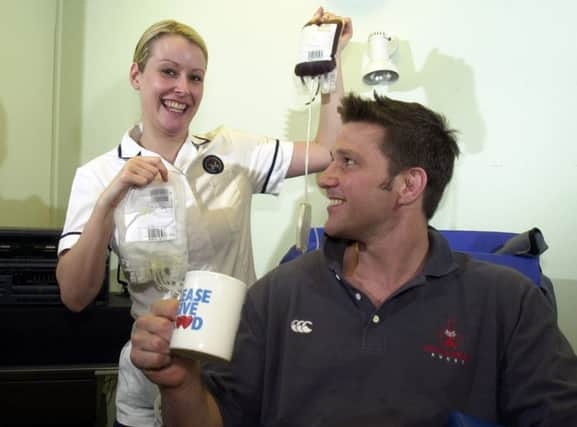Experts warn of looming blood shortage in Scotland


The Scottish National Blood Transfusion Service (SNBTS) said keeping supplies of eight different blood groups at sufficient levels was “a constant challenge” as it called for more people to donate.
Patients being treated for cancer or undergoing surgery, as well as women giving birth, are among those whose lives can be saved by blood transfusion.
Advertisement
Hide AdAdvertisement
Hide AdAround 600 people currently donate blood in Scotland each day at centres across the country.
SNBTS aims to have between five and seven days-worth of supplies of all blood groups at all times.
As blood cannot be stockpiled, the service is reliant upon donors coming forward regularly.
The numbers of active blood donors has decreased in recent years, but adequate supplies have been maintained as a result of a reduction in demand for red cells caused by clinicians making the best use of every donation and ongoing medical advances.
But SNBTS anticipates demand for red cells and other products will rise as a result of Scotland’s ageing population.
While the proportion of the population receiving a blood transfusion is less than 1 per cent per annum below the age of 65 years, it rises to 2.3 per cent between the ages of 65 and 84, and to 4.9 per cent beyond the age of 85 years.
Dr Moira Carter, associate director at SNBTS, said, “You can start giving blood at the age of 17, and we would encourage everyone in Scotland to sign up. There are currently 123,500 active blood donors in Scotland – to be an active blood donor you must have given blood at least once in the past two years.
“We also ask people to be aware of their blood group, so they can help us if supplies of their blood group are low. Once you give blood for the first time, we will write to you and let you know your blood group. All blood groups are important, and in particular O Negative blood is the only blood group that can be safely given to anyone in an emergency. It is for this reason that it is known as the universal blood group.
Advertisement
Hide AdAdvertisement
Hide Ad“Only nine per cent of people in Scotland have O Negative blood, but it is needed for 12 per cent of all transfusions. O Negative blood really does keep A&E wards running – so we ask everyone with this special blood group to give as often as they can, leaving at least 12 weeks in between donations.”
Dr Carter continued: “Our blood donors are fantastic, and do help to keep supplies at safe levels.
“We do notice, however, a down turn in donations at certain times. Currently, we are asking donors with blood groups O+, O-, and AB- to make an extra special effort to come forward.
“During September and October donor attendances have been down by more than 10 per cent while the demand for blood has remained high. This is because many regular donors are busy with the school half term, and October holidays so supplies can drop. We have had an excellent response from donors so far, and would like to encourage everyone to keep up the good work.”
Many blood donors do not realise their donation can be split into several life saving parts, including red cells, platelets and plasma.
Doctors then work had to manufacture life saving products from each donation.
This year, SBTS expect to issue more than 163,000 units of red cells, 25,000 units of platelets, 18,600 units of Fresh Frozen plasma and 2155 units of cryoprecipitate to ensure that patients in Scotland receive the treatment they need when they need it.
“This means by giving a single donation you can save or improve the lives of up to three separate people,” added Dr Carter.